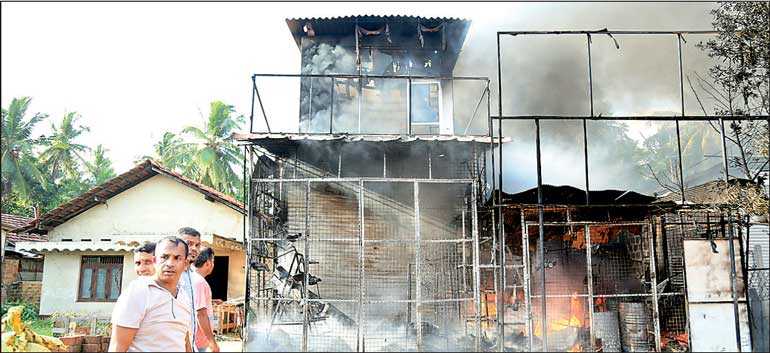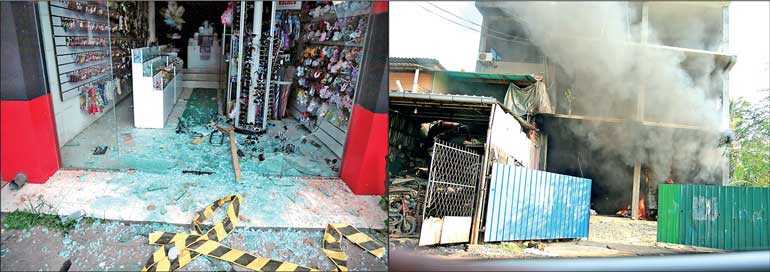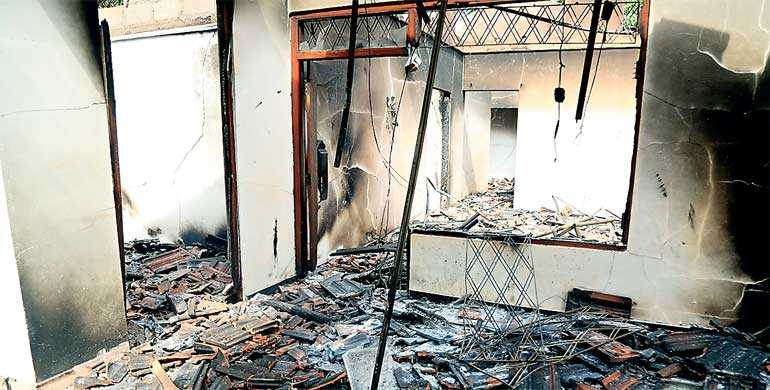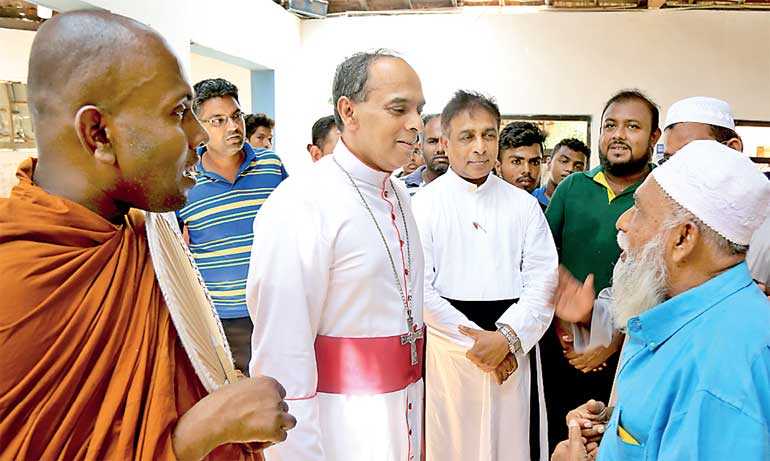Sunday Feb 22, 2026
Sunday Feb 22, 2026
Friday, 17 May 2019 00:00 - - {{hitsCtrl.values.hits}}




By Shanika Sriyananda
An hour after declaring curfew to control mob violence, the public would expect tensions to be allayed. But in Hettipola on 14 May, it was not so. The mob went on rampage despite the curfew.
The attackers, armed with thick iron poles, rusty swords, and long knives, moving freely on motorbikes and in trishaws. Most of them were in their late 20s or mid-30s and were clad in shorts and t-shirts. They were brandishing swords or iron poles. They were ordering those who were on the road to attack nearby buildings and to set fire to them.
The Police corps, who were surrounded by over 500 angry attackers demanding the release of five I suspects arrested by police on Monday morning, were seen gathered inside the Hettipola Police Station. While hundreds of attackers were still vandalising properties owned by Muslims, those Police personnel waited helplessly until they received additional support from the Special Task Force and the Army to control the situation.
The mob had stormed into the town and interior of Hettipola, according to them to ‘search’ for Muslims extremists and hidden swords and explosives.
Instead of ‘searching,’ they, taking the law into their hands, had stoned shops, vehicles and houses and set fire to properties belonging to Muslims along the main road.
They had vandalised a fruit shop belong to a Muslim and fruits, mostly imported apples and oranges, were strewn all over the pavement. The attackers, having broken the glass windows of a well-known shoe shop in Hettipola Town, had damaged the inside of the entire shop.
They threw petrol on a lorry parked in the three-storey building, which is yet under construction, and set it on fire. “Hodata petrol dapan (throw petrol well),” two attackers ordered the gang who went inside the building.
“Duwapan duwapan. Oka bomba lorriyak,” (run, run… this is an explosive-laden lorry) they ordered the attackers again. The entire building was soon engulfed in raging flames.
We proceeded further. The attackers were hurriedly destroying the remaining buildings and houses. They did not search the vehicles caught in the congestion but had a closer look inside vehicles on road while ordering the passengers not to use mobile phones to get videos or photos of the mob.
The clear blue sky turned to grey with black smoke from the burning buildings and tyres that they set on fire along the main road.
Further in the town, hundreds of attackers armed with the iron poles and rods jubilantly rushed from inner lanes to the main road after attacking the properties belonging to Muslims.
Hettipola, a peaceful town where Sinhalese and Muslims had co-existed for decades, became a lawless land for a few hours. The town and its people were in attackers’ custody despite curfew and heightened security.
With vehicles still plying on the Chilaw-Kurunegala main road and due to congestion, the attackers blocked the road and ordered the vehicles to turn and leave the town.
Villagers of Hettipola who had thronged into the town gathered in groups to watch the drama helplessly. “We don’t know who these people are. These are not our youth. We are scared too,” an elderly man clad in a sarong said, while our vehicle was immobile in the heavy congestion.
On our return to the town, most of the buildings which were set on fire when we were proceeding in the other direction were engulfed in flames. No one was attempting to douse the fires but were only watching as the attackers were still actively attacking Muslim-owned properties.
Since we were not ready to leave the town without getting the views of the affected Muslims, we parked our vehicle close to Parliamentarian Dayasiri Jayasekara’s house, a few metres away from the Hettipola Police Station. He was with some people and his security personnel.
“It is very unfortunate to see these incidents happening in our areas, where Sinhalese and Muslims have been living peacefully for centuries. Sinhalese are living in fear of bomb attacks by Muslim extremists and they think those people are hiding in Muslim villages. They have asked the Police and the security forces to search mosques and Muslim houses to see whether they have swords and extremists hiding their houses. But they ignored those requests,” he claimed when we reached him to get a comment.
MP Jayasekara said he helped the Police control the tense situation in the morning which occurred due to transferring five suspects of the Kiniyama incident from the Bingiriya Police Station to the Hettipola Police Station.
“A mob of 500 people surrounded the Police station and demanded the release of the five suspects. I intervened and took them back to the Bingiriya Police Station, where they were granted bail. Police is investigating the issue further. I urge the Government to search mosques and houses for weapons to bring normalcy to the area,” he said, adding that they were closely working with all the communities to restore peace in these areas.
Back in the vehicle, we saw a group of attackers freely riding their bikes in front of Jayasekara’s house while he was talking to someone on his mobile. I expected this Parliamentarian, who I thought had a strong voice among his voters, would try to control the attackers, if they were angry villagers from his electorate, to keep the situation under control to save Muslim families, which are also his voters.
But he was still seen standing in front of his house with his ‘people’ on that fateful afternoon. I thought for a moment that he too was helpless and terrified to face the unknown attackers.
After two hours of declaring curfew, the Army vehicles carrying additional troops had arrived in Hettipola town. Meantime, most attackers had fled the town, causing huge damage to the properties but most importantly causing lifelong scars in the minds of most Muslims who have no relationship or connection to the mastermind of the coordinated suicide bomb attacks on Easter Sunday – Zahran Hashim or the Muslim extremists.
“This shop belongs to me and my brother. They just destroyed it,” a middle-aged Muslim man told us pointing at a building in flames when we parked the vehicle. The area was covered in black smoke from burning buildings, houses, vehicles and tyres.
He was shivering and his voice was shaky. Young and old Muslim men who came near our vehicle, which was the only civilian vehicle except for military vehicles plying that road after the curfew, wanted to tell us their plight. They all wanted help and were terrified.
With the Fire Brigade yet to reach the area, they were trying to douse the fires in their properties to salvage what they could. An elderly woman in a long yellow dress threw water from a bucket and a youth sprayed water with a hose in an attempt to douse the raging flames that had engulfed their property. Everyone was trying hard to stop the flames from spreading further.
“Please go to the interior to see how they have attacked us. They have set fire to our school. The mosque is totally damaged. We are helpless,” said another.
An elderly man with a moustache said over 100 houses and vehicles had been burnt by the attackers. A motorbike reached us and took a photograph of our vehicle. Before I could take down the names of those who spoke to us, they dispersed as if they had received a signal from the man wearing a helmet and covering his face while taking the picture of our vehicle. Fear was etched in every face. Some elderly women and men were seen crying sitting in front of their damaged properties. Some were collecting remaining valuables from the debris. The youth looked shell-shocked, their lives reduced to rubble.
